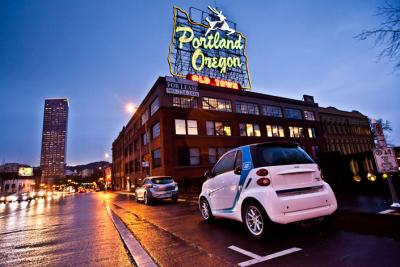Oregon has quite the reputation for being electric-vehicle friendly.
That reputation holds true if you already own an EV—the state’s a wonderland in terms of charging infrastructure—but for those who want to replace the fossil-fuel burner, the state hasn’t helped make the path to EV ownership any easier.
WATCH: Energica Ego Electric Superbike Beats 2 Teslas, Ferrari In 1/4-Mile (Video)
Now, at last, state legislators are considering a bill that would offer those who buy or lease an electric car, plug-in hybrid, or even fuel-cell vehicle a cash incentive.
That incentive would be what Drive Oregon executive director Jeff Allen called a “cash on the hood” incentive—provided at the time of sale, when it could be applied toward the down payment or perhaps lessen the amount financed.
And it could be enacted this year. House Bill 2092 would give those buying or leasing plug-in hybrids a $1,500 incentive, while a $3,000 incentive would apply to those getting an all-electric vehicle.
That bill moved from the House Committee on Energy and Environment on to the Revenue Committee this past week, after backing testimony from Drive Oregon as well as the Auto Alliance, General Motors, and others earlier this month.
![DC Fast-Charging Stations in Oregon and Washington states, January 2015 [map: PlugShare.com] DC Fast-Charging Stations in Oregon and Washington states, January 2015 [map: PlugShare.com]](https://images.hgmsites.net/lrg/dc-fast-charging-stations-in-oregon-and-washington-states-january-2015-map-plugshare-com_100496323_l.jpg)
DC Fast-Charging Stations in Oregon and Washington states, January 2015 [map: PlugShare.com]
Limited-time incentive on a wide range of ‘green’ cars
The bill wouldn’t just subsidize electric cars, though; plug-in hybrids would be eligible for the $1,500 as well, while hydrogen-powered vehicles would be aligible for $3,000, zero-emission (electric) motorcycles for $1,000, and neighborhood electric vehicles (for subdivisions and golf courses, for instance) for $750.
The incentive would time out on January 1, 2022, and if passed in this legislative session it could begin as soon as this October.
“This needs to be a time-limited program from the beginning,” emphasized Allen recently, when we discussed the bill. “This is only intended to jump-start the market for these vehicles and get this to a critical mass.”

car2go - Portland, OR
A number of states currently offer incentives, tax credits, or rebates. Neighboring California has a rebate program, and Washington makes electric vehicles exempt from sales tax—a savings, potentially, of many thousand dollars on a vehicle like the Tesla Model S.
Georgia, until recently one of the most EV-friendly states in the nation, this month eliminated its $5,000 income-tax credit on the purchase of electric vehicles, while also adding a $200 registration fee on them.
Oregon would push for language that the law would be funded for its full duration; it would also contract out the management of the program to an independent organization.
Some resources from the bill would also go toward pilot projects working to get electric vehicles to low-income communities, and perhaps rural communities.
Lets Oregon—and Portland—catch up with its reputation
Such a bill would put Oregon’s money where its mouth is, so to say, as the state has been extremely well-coordinated and forward-thinking with respect to charging infrastructure but up until now has lacked either incentives or tax credits for the electric vehicles that plug into them.
Portland in particular has long held a reputation for being an electric-vehicle hotbed—long before the Nissan Leaf arrived in 2010, actually—and its combination of relatively short (18-mile) average daily commutes, mild temperatures, and ‘green’ consumer attitudes have made it a top proving ground for the electric-vehicle segment.

ECOtality DC fast charger - Portland, OR
Portland and Oregon aren’t exactly huge vehicle markets; Oregon accounts for less than two percent of the new-vehicle market. Yet it has built up an impressive charging infrastructure.
According to the U.S. Department of Energy, there are 906 public charging outlets in Oregon, out of about 24,000 in the nation. And as of late last year the state has around 65 fast chargers in operation—by a significant margin the most per capita of any U.S. state. And many of those are placed strategically for EV tourism.
The ZEV reality in numbers
If you look at the numbers that Oregon needs to hit to meet the ZEV mandate—the stricter target that requires zero-tailpipe-emissions vehicles to be 15 percent of the new-vehicle mix by 2025, in California, Oregon, and seven other states—the incentives are essential.
Electric vehicles stand at a bit over one percent of sales in the state, and just around 6,000 registered vehicles in the state. To get to 15 percent they’ll need to add to around 100,000 total vehicles by then—or 300,000 total registered EVs to meet climate-change targets, Allen points out.
The Union of Concerned Scientists has also waged an aggressive pro-incentive campaign to point out some of the advantages of EVs in general.
Given Oregon's power-grid mix, the average battery-electric vehicle in the state will cut carbon emissions to the level of a 75-mpg gasoline vehicle and save more than $7,000 over its lifetime in energy costs versus one.
_________________________________________












